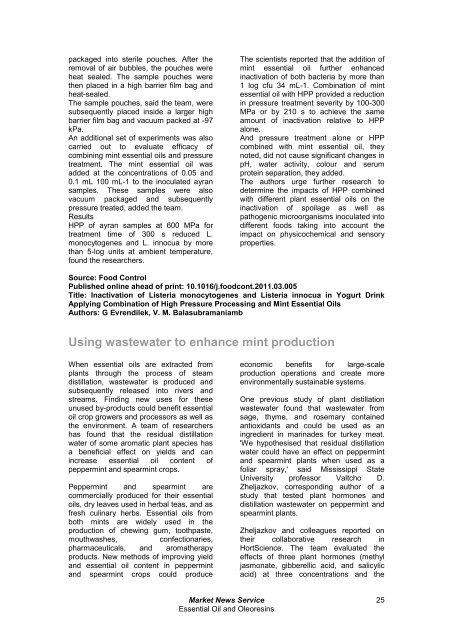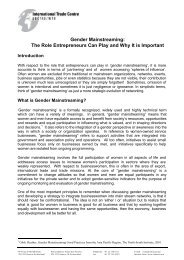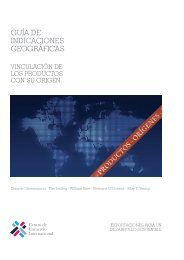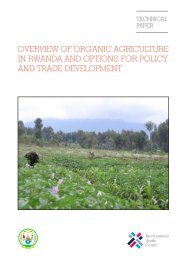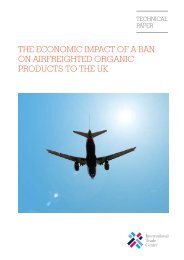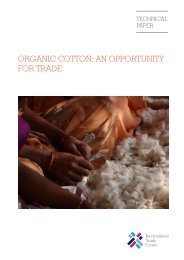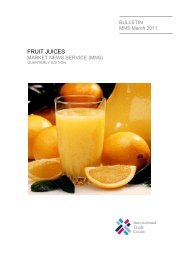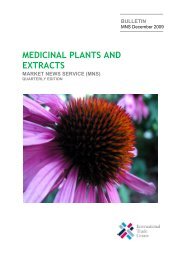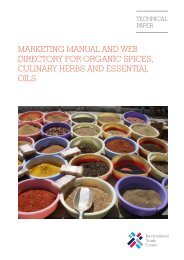Market News Service - International Trade Centre
Market News Service - International Trade Centre
Market News Service - International Trade Centre
You also want an ePaper? Increase the reach of your titles
YUMPU automatically turns print PDFs into web optimized ePapers that Google loves.
packaged into sterile pouches. After the<br />
removal of air bubbles, the pouches were<br />
heat sealed. The sample pouches were<br />
then placed in a high barrier film bag and<br />
heat-sealed.<br />
The sample pouches, said the team, were<br />
subsequently placed inside a larger high<br />
barrier film bag and vacuum packed at -97<br />
kPa.<br />
An additional set of experiments was also<br />
carried out to evaluate efficacy of<br />
combining mint essential oils and pressure<br />
treatment. The mint essential oil was<br />
added at the concentrations of 0.05 and<br />
0.1 mL 100 mL-1 to the inoculated ayran<br />
samples. These samples were also<br />
vacuum packaged and subsequently<br />
pressure treated, added the team.<br />
Results<br />
HPP of ayran samples at 600 MPa for<br />
treatment time of 300 s reduced L.<br />
monocytogenes and L. innocua by more<br />
than 5-log units at ambient temperature,<br />
found the researchers.<br />
<strong>Market</strong> <strong>News</strong> <strong>Service</strong><br />
Essential Oil and Oleoresins<br />
The scientists reported that the addition of<br />
mint essential oil further enhanced<br />
inactivation of both bacteria by more than<br />
1 log cfu 34 mL-1. Combination of mint<br />
essential oil with HPP provided a reduction<br />
in pressure treatment severity by 100-300<br />
MPa or by 210 s to achieve the same<br />
amount of inactivation relative to HPP<br />
alone.<br />
And pressure treatment alone or HPP<br />
combined with mint essential oil, they<br />
noted, did not cause significant changes in<br />
pH, water activity, colour and serum<br />
protein separation, they added.<br />
The authors urge further research to<br />
determine the impacts of HPP combined<br />
with different plant essential oils on the<br />
inactivation of spoilage as well as<br />
pathogenic microorganisms inoculated into<br />
different foods taking into account the<br />
impact on physicochemical and sensory<br />
properties.<br />
Source: Food Control<br />
Published online ahead of print: 10.1016/j.foodcont.2011.03.005<br />
Title: Inactivation of Listeria monocytogenes and Listeria innocua in Yogurt Drink<br />
Applying Combination of High Pressure Processing and Mint Essential Oils<br />
Authors: G Evrendilek, V. M. Balasubramaniamb<br />
Using wastewater to enhance mint production<br />
When essential oils are extracted from<br />
plants through the process of steam<br />
distillation, wastewater is produced and<br />
subsequently released into rivers and<br />
streams. Finding new uses for these<br />
unused by-products could benefit essential<br />
oil crop growers and processors as well as<br />
the environment. A team of researchers<br />
has found that the residual distillation<br />
water of some aromatic plant species has<br />
a beneficial effect on yields and can<br />
increase essential oil content of<br />
peppermint and spearmint crops.<br />
Peppermint and spearmint are<br />
commercially produced for their essential<br />
oils, dry leaves used in herbal teas, and as<br />
fresh culinary herbs. Essential oils from<br />
both mints are widely used in the<br />
production of chewing gum, toothpaste,<br />
mouthwashes, confectionaries,<br />
pharmaceuticals, and aromatherapy<br />
products. New methods of improving yield<br />
and essential oil content in peppermint<br />
and spearmint crops could produce<br />
economic benefits for large-scale<br />
production operations and create more<br />
environmentally sustainable systems.<br />
One previous study of plant distillation<br />
wastewater found that wastewater from<br />
sage, thyme, and rosemary contained<br />
antioxidants and could be used as an<br />
ingredient in marinades for turkey meat.<br />
'We hypothesised that residual distillation<br />
water could have an effect on peppermint<br />
and spearmint plants when used as a<br />
foliar spray,' said Mississippi State<br />
University professor Valtcho D.<br />
Zheljazkov, corresponding author of a<br />
study that tested plant hormones and<br />
distillation wastewater on peppermint and<br />
spearmint plants.<br />
Zheljazkov and colleagues reported on<br />
their collaborative research in<br />
HortScience. The team evaluated the<br />
effects of three plant hormones (methyl<br />
jasmonate, gibberellic acid, and salicylic<br />
acid) at three concentrations and the<br />
25


